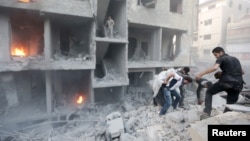Forces loyal to Syrian President Bashar al-Assad have added another improvised, indiscriminate weapon to their arsenal: "elephant rockets," named after the noise they make in flight. According to political activists, at least two dozen civilians were killed Tuesday in a Damascus suburb by the rockets.
The ground-to-ground rockets were targeted this week on the suburb of Douma when clashes intensified between rebels and government forces. The suburb has been a battleground between insurgents trying to oust Assad and forces loyal to him for more than four years.
At least 24 people died when a series of elephant rockets struck, according to opposition activists. The suburb was also hit by airstrikes and a hospital was flattened. More than 60 were injured in the barrage of airstrikes and elephant rockets.
Yasser Doumani, a local anti-Assad activist, posted a YouTube dispatch saying civilian properties were hit and the dead included many women and children.
Aiming to terrorize populations
For the past 18 months Assad’s most feared improvised weapon was the barrel bomb. Dropped by helicopters, the bombs, first used in August 2012, are rudimentary devices cheaply made from oil drums or cylindrical containers packed with TNT and an assortment of metal parts, steel fragments or fuel, which are then topped off with a basic fuse that detonates on impact. Not equipped with any kind of guidance system, the bombs are simply rolled out of helicopters or planes.
Elephant rockets are also cheaply improvised weapons made by attaching rocket motors to large bombs. The range of the rockets is limited, but they have a similar double effect as barrel bombs. They can cause large explosions and terrorize populations.
In videos posted online by Douma opposition activists, the rockets' destructive power was on clear display this week, with buildings caved in and rescuers frantically trying to dig the injured out of the rubble. “Civil Defense has documented until now, by name and by photograph, 23 people who died because of the bombing,” Mahmud Adam, spokesman for a volunteer rescue organization, told the Syria Direct news site Wednesday.
Other activists working with the Syrian Observatory for Human Rights, a British-based pro-opposition group that relies on sources inside Syria, put the death toll higher. “The number of civilians who were killed … has risen to 24 at least, including 13 women and 5 children, where some bodies were recovered from under the rubble of buildings,” the Observatory stated on its website.
“Dozens of civilians were killed in missile attacks and air raids on the town of Douma near Damascus, while many more are still buried under the rubble,” said Salem al-Meslet, the spokesman for the Syrian National Coalition, a Western- and Gulf-backed umbrella organization of opposition forces.
Western condemnation
Western governments and international rights groups have repeatedly condemned the use of indiscriminate weapons on mainly civilian-populated areas by the Assad government.
U.S. Secretary of State John Kerry said Tuesday: “I think everybody’s patience is wearing thin with respect to the extraordinary depravity of the weaponry and mechanisms for delivery which Assad has used against his own people.” His remarks to reporters came after a phone conversation with Russian Foreign Minister Sergei Lavrov about the alleged use by Assad forces of chlorine gas.
Kerry said he was “absolutely certain” that the Syrian government had attacked civilians with chlorine, although he noted insurgents may have had access to chlorine gas as well. He added, though: “We are certain that the preponderance of those attacks have been carried out by the regime, and we're putting together a portfolio of that data that supports that even as we speak now.”
The Assad government has repeatedly denied accusations of using chlorine gas.
In what appeared to be a retaliation for the Douma strikes, rebels were reported to have fired shells into the center of the Syrian capital in the early hours of Wednesday morning, killing at least nine people and wounding others near Arnous Square and al-Adawi, according to the state-run SANA news agency.
'A war crime'
Assad’s forces were also accused at midweek of mounting an airstrike on the town of Eastern Ghariya in rural Dara’a, killing as many as 23 children as they were leaving a mosque. The Syrian National Coalition dubbed the attack “a war crime.” In a statement, the coalition said the attacks this week stressed “the need to expedite the arming of the Free Syrian Army and the establishment of safe zones in northern and southern Syria.”
Meanwhile, in northern Syria, Kurdish forces were pledging to advance farther into territory controlled by the Islamic State after their quick success in capturing the Syrian border town of Tal Abyad this week. They vowed to launch an offensive on the Islamic extremists’ de facto capital in Syria, Raqqa.
But some analysts warned Islamic State fighters might try to push forward with an offensive of their own at the crossing on the Syrian-Turkish border at Azaz to compensate for their loss of Tal Abyad, which had served as a major supply route for the Islamic State. “We have seen signs of a renewed offensive,” said a European diplomat based in Turkey.
Last month, in a surprise offensive, Islamic extremists nearly seized Azaz from Syrian rebel militias.




